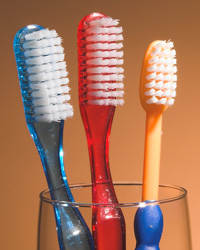Healthy Smooching: Good Oral Hygiene Leads to Great Kisses
Whether you're preparing for holiday mistletoe or are just in the mood for some love, you're probably fully aware of the connection between the state of your mouth and the quality of your kisses. Still, a little reminder never hurt. Here's the skinny on getting lucky without embarrassment (from your mouth, anyway)!
Kick the Smoking Habit
I'm sure you're very familiar with the smoking lecture. Not only do tobacco products taste awful to your partner, but they put you at greater risk for oral cancer and periodontal or gum disease. Why put so much effort into knocking your sweetheart's socks off if you aren't going to be around to pick them up? If you don't kick the habit for your partner, do it for yourself.
Don't Chew Gum
The best smooches are spur of the moment, so it's best to be prepared for them. Besides, sugary gum can lead to tooth decay, AKA cavities. If you must chew gum (maybe you want your breath to be in top shape), choose a sugar-free variety like Xylitol.
Brush and Floss
Nothing leaves an impression like bad breath, but it's not the kind of attention you want. Besides, healthy white teeth will help you build confidence in your smile. Brushing your teeth and gums is a good start, but take it a step further and floss each night. You'll dislodge food particles and remove odor-causing, not to mention tissue- and tooth-destroying, bacteria. If you don't have your toothbrush handy after you eat, at least rinse your mouth out with warm water. There are also a number of handy little dental hygiene products available for great breath on the go.
Take good care of your partner by caring for yourself. If you find that your gums are exceptionally tender or swollen, or if you have habitually bad breath, make an appointment with your dentist. These could be symptoms of a more serious problem!

+Jim Du Molin is a leading Internet search expert helping individuals and families connect with the right dentist in their area. Visit his author page.
Are Your Teeth Temperamental? Dealing With Sensitive Smiles
Are you overly sensitive? Relax, it has nothing to do with crying during life insurance commercials. Millions of adults struggle with hypersensitive teeth, which means they are sensitive to hot and cold temperatures, very sugary or acidic foods and drinks and vigorous tooth brushing. This kind of sensitivity is often called "dentin hypersensitivity."
Dentin is the tissue that makes up the core of each tooth. Above the gum line, dentin is protected with a coating of enamel. Unfortunately, as enamel is worn away or decayed, dentin becomes exposed and receptive to sensations that cause painful nerve responses. This can also occur as the result of receding gums, a common symptom of gum disease.
So, what causes sensitive teeth? A number of things may be to blame. Over-zealous brushing with a firm bristled tooth brush or abrasive toothpaste can lead to dentin hypersensitivity, as can gum disease, which is the result of poor brushing and flossing habits. Your diet may also play a role, as frequent consumption of acidic foods and drinks can chemically dissolve tooth enamel. Finally, abnormal wear on tooth surfaces from chronic clenching or grinding of teeth, nail biting and chewing on hard objects can lead to sensitive teeth. To avoid the problem, brush and floss daily to maintain healthy gums and protect dentin from exposure. Avoid vigorous tooth brushing with a hard-bristled toothbrush.
If you're already suffering from overly sensitive teeth, your best bet is to contact your dentist for guidance on dental hygiene. In the mean time, there are products that can help. Desensitizing toothpaste used in conjunction with a soft-bristled toothbrush can help. Toothpaste designed for those with sensitive teeth can reduce the pain associated with the condition after only a few days of use.

+Jim Du Molin is a leading Internet search expert helping individuals and families connect with the right dentist in their area. Visit his author page.







